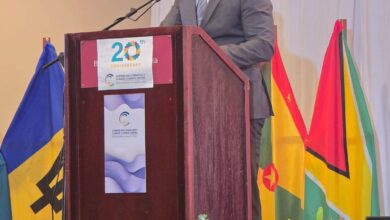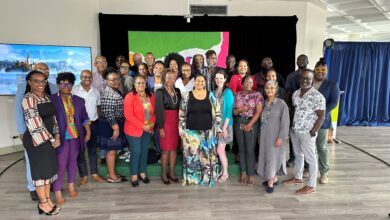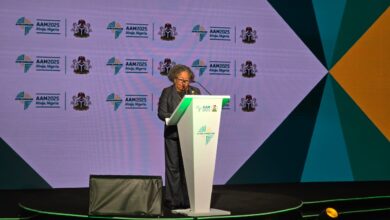ESTABLISHMENT OF CARIBBEAN COMMUNITY AND COMMON MARKET
The Eight Heads of Government Conference, which met in Georgetown from 9th – 12th April, 1973, has decided to establish the Caribbean Community (including the Caribbean Common Market.)
The areas of agreement on which this historic decision was taken are embodied in an agreed document entitled “The Georgetown Accord” which was signed at the conclusion of the Conference. In it, the Commonwealth Caribbean Governments through their Heads of Delegations to the Eight Conference have reaffirmed their common determination to fulfil, within the shortest possible time, the hopes and aspirations of the people of the Caribbean territories for industrial and agricultural development, full employment and improved living standards. The Heads of Delegations recorded their convictions that these goals could most rapidly be attained through deepening the integration process already established within the Caribbean Free Trade Association. Special measures outlined in the Accord aim at providing all Member States opportunities for sharing equitably in the benefits of regional economic integration. They also stressed the vital necessity of enhancing the bargaining power of the Region in relation to third countries, groups of third countries and extra-regional entities providing goods, services, technical assistance and funds to the countries of the region. The Community Treaty formalises and strengthens existing areas of functional cooperation.
The Conference was attended by delegations from the following territories:- Antigua, Barbados, Belize, Dominica, Grenada, Guyana, Jamaica, Montserrat, St. Kitts-Nevis-Anguilla, St. Lucia, St. Vincent and Trinidad and Tobago.
At the Inaugural Session, the Hon. L.F.S. Burnham, Prime Minister of Guyana and Leader of the Guyana Delegation was elected Chairman by acclamation. Mr Burnham gave an Address of Welcome to the visiting Heads of Government and of Delegations. Replies were made by the Rt. Hon. Errol Barrow, Prime Minister of Barbados; the Hon. Robert Bradshaw, Premier of St. Kitts-Nevis-Anguilla; Hon. James Mitchell, Premier of St. Vincent; and Hon. Michael Manley, Prime Minister of Jamaica.
STEPS TO COMMUNITY
The Heads of Governments have agreed on the following steps for the establishment of the Caribbean Community and Common Market. The Caribbean Community (including the Caribbean Common Market) will be established on the basis of an agreed Treaty. As anticipated within the framework of the CARIFTA Agreement, the Caribbean Community (including the Common Market) will supersede the Caribbean Free Trade Association. This will take effect on 1st May, 1974.
The Government of Barbados, Guyana, Jamaica and Trinidad and Tobago have undertaken to sign and ratify the Community Treaty, subject to and in accordance with their constitutional procedures, so as to enable the Caribbean Community and Caribbean Common Market to be established as between these four countries on 1st August, 1973. The signing ceremony will be held at Chaguaramus, Trinidad and Tobago, on 4th July, 1973 the anniversary of the birth of the late Right Excellent Norman Washington Manley. The Conference chose this date as a tribute to the contribution to Caribbean regionalism made by the Jamaica National Hero.
The Government of Belize, Dominica, Grenada, St. Kitts-Nevis-Anguilla, St. Lucia and St. Vincent have likewise undertaken to sign and ratify the Treaty, subject to and in accordance with their constitutional procedures, so as to become contracting parties thereto by 1st May, 1974.
The declared intention of the Governments of Antigua and Monserrat to give urgent consideration to the signing of the Accord and thereupon to assume the undertakings and obligations of a Less Developed Country under it was welcomed by all signatory Governments. A team of Ministers from the More Developed Countries accompanied by the Secretary-General of the Regional Secretariat, will visit Monserrat on 3rd and 4th May, 1973, for the purpose of working out special development measures for that territory.
To mark this far-reaching advance in the Regional movement, it has been decided by Heads of Governments that, beginning from next year, 1974, the first Monday in July will be designated Caribbean Day. It was suggested that consideration be given to having this day declared a Public Holiday throughout the Region and that special Caribbean Community Honours might be awarded each year on that day.
SOME ECONOMIC INTEGRATION INSTRUMENTS
The Caribbean Investment Corporation
As provided for in the accord, the Heads of Governments agreed to sign on Agreement at the conclusion of the Conference which establishes on 1st June, 1973, the Caribbean Investment Corporation. The Corporation will be required to proceed expeditiously with supporting programmes of investment in the Less Developed Countries based on an agreed list of industries.
Harmonisation of Fiscal Incentives to Industry
An Agreement on the Harmonisation of Fiscal Incentives to Industry among the CARIFTA countries was also considered at the same time. this Agreement pays special attention to the needs of the Less Developed Countries by, inter alia, allowing tem to grant a greater maximum number of years tax holidays than the More Developed Countries as well as providing that the More Developed Countries will refrain from granting income tax holidays to an agreed list of industries suitable for location in the Less Developed Countries.
Intra-Regional Double Taxation Agreement
It was also agreed that a Double Taxation Agreement between the More Developed and the Less Developed Countries would be brought into effect on 1st June, 1973 in order to encourage a greater flow of investment capital within the Region, paying special attention to the development needs of the Less Developed Countries.
Rationalisation of Agriculture
Another measure provided for in the Accord is the working out of a scheme for the Rationalisation of Agriculture in the Region, to be introduced by 1st July, 1975 and which will contain special provisions for the benefit of the Less Developed Countries.
Regional Perspective Plan
Immediate steps will also be taken to commence the technical work on a Regional perspective Plan designed to make the fullest use of the Region’s resources. It will aim at achieving specific development targets in all countries of the Region, including the Less Developed Countries.
Regional Cooperation in Price Control
The Heads of Governments in considering other aspects of Regional Economic Cooperation gave attention to the problem of rising prices in the countries of the Region and to measures of price control. It was agreed that Governments would exchange information at regular intervals on the prices of imported goods. Such information would relate to a selection of commodities that influence the cost of living and the prices of machinery and equipment. Consideration was also given to other measures, including possible economies from bulk purchase on a joint basis by countries of the Region.
Regional Commission on Standards, Quality and Prices
Heads of Governments also decided to establish no late than 1st May, 1974 under the Caribbean Common Market arrangements a Commission on standards, quality and prices of goods with a view of safeguarding the interest of consumers in all countries of the Region.
EXTERNAL RELATIONS
Relations with the E.E.C.
The Heads of Governments considered the question of relations between the CARIFTA countries and the enlarged European Economic Community and re-affirmed the decision of the Seventh Heads of Government Conference that the CARIFTA countries should seek to achieve a group-relationship with the EEC, without prejudice to the right of the non-independent countries to choose their own from of relationship with the EEC.
Relations with Canada
The Heads of Governments decided to seek an early opportunity for discussions with Canada on the West Indies/Canada Agreement of 1925.
Relations with Cuba
The four independent Commonwealth Caribbean Countries agreed to send a Joint Trade Mission to Cuba in May 1973 to discuss opportunities for mutual trade.
Relations with Japan
The four independent countries also considered the possibility of future joint approaches to the establishment of Diplomatic Missions abroad. In this connection it was noted that Jamaica intended to establish a Diplomatic Mission in Tokyo this year and the possibility of this Mission serving the needs of the Region was also considered.
Action Programme for Economic Coopeation adopted by the Georgetown Conference of Non-Aligned Countries in August 1972
The Conference considered this matter and agreed to support the request of the Guyana Government and the Commonwealth Caribbean Regional Secretariat for assistance by ECLA in the formulation of an inter-regional project which would seek to implement the provisions of the Action Programme for Economic Cooperation in the fields of Trade, Industry and Transport.
FUNCTIONAL COOPERATION
Regional Management of the Institute of International Relations, U.W.I. (St. Augustine)
The Heads of Governments agreed that Commonwealth Caribbean Governments should participate in the management of the Institute as provided for in its Constitution. The Heads of Governments of Barbados, Guyana and Jamaica signified the intention of their Governments to participate in the Institute. The Conference noted that the Government of Trinidad and Tobago pledged continuing support for the Institute.
Budget of Manpower Survey
The Heads of Governments approved of the budget for a Manpower Survey of the entire Region. The Survey, which would be conducted by a Technical Committee, is intended to provide a firm basis for determining the expansion of University and general post-secondary facilities, through the assessment of the requirements for trained manpower at the professional, administrative, managerial and sub-professional levels in both the public and private sectors.
Emergency Relief in the eastern Caribbean
The Heads of Governments agreed that a Regional Conference should be held in July 1973 to discuss and formulate an overall plan for “Search and Rescue Operations.”
West Indies Student Centre in London
The Heads of Governments in considering the question of the funding of the Centre decided that the High Commissioners of Commonwealth Caribbean Governments and the Commissioner of the Associated States in London should be asked to examine and report on the management, operations and facilities of the Centre and the purpose served.
Training in Banking
The Heads of Governments decided that raining at the middle and lower levels of banking might be examined by a meeting of Managers of nationally owned and controlled banking institutions and Regional Monetary Authorities with a view to coordinating training and making such training available to personnel from all territories. With regard to training at higher management levels, it was agreed that the regional Universities (U.W.I. and U.G.) should be invited to cooperate with managers of nationally owned and controlled banking institutions and Monetary Authorities in examining the possibility of providing facilities for such training in the first instance by short courses.
New UNESCO Mass Communications project in the Leeward and Windward Islands
The Heads of Government strongly endorsed a proposed project designed to raise the level of mass communications development in the Less Developed Countries of the leeward and Windward Islands. The project, which will cost approximately 1.3 million dollars (US) – to be met by the UNDP – will upgrade and expand mass communications facilities in the interest of overall national development and will provide for the training of personnel in those countries.
Publicity for Regional Cooperation
Proposals were also approved for a competition for the design of an Emblem for the Caribbean Community, and for an Essay Competition for Sixth Formers in Secondary Schools of CARIFTA Countries and the Bahamas on the subject “How can Regional Cooperation help to overcome the Economic and Social problems of the English-speaking Caribbean”. An advertisement giving the details for both competitions will be published simultaneously throughout the Region. Heads of Governments also noted and welcomed the UNESCO sponsored Project for the projection of the Caribbean Community through the media of the press, Radio and Television to the people of the Region in the month of May.
THE BAHAMAS
The Heads of Governments strongly welcomed the forthcoming achievement, in July, of Independence by the Commonwealth of the Bahamas and looked forward to its participation in the Caribbean Community.
COLONIALSIM AND APARTHEID
The Heads of Governments took note of the Conference now taking place in Oslo on Colonialism and Apartheid in Southern Africa under the joint auspices of the United Nations and the Organisation of African Unity and passed on the motion of the delegation of Barbados the following Resolution which they requested the Secretary-General to forward immediately to the Conference as an expression of their support for the purposes of the Conference and their commitment to the achievement of its objectives:
“The Eighth Conference of the heads of Government of Commonwealth Caribbean Countries meeting in Georgetown, Guyana, from 9 – 12 April, 1973:
NOTING the significance of the International Conference of Experts for the support of victims of Colonialism and Apartheid in Southern Africa now meeting in Oslo under the joint auspices of the United Nations and the Organistion of the United nations and the Organisation of African Unity;
CONSCIOUS that apartheid and racialism constitute organised programmes of violence against the indigenous peoples of Africa and against the human personality generally;
DISTURBED at the continuation and intensification of policies of discrimination pursued by the minority racist regimes in Southern Africa;
CONCERNED over the perpetration of acts of aggression by these regimes against independent African States;
DEPLORING the economic, political and military support which these regimes continue to receive from certain developed States;
MINDFUL of the heroic efforts of the Liberation Movements in Africa in the struggle for freedom and self-determination;
|
1. Reaffirms the abhorrence of Commonwealth Caribbean Governments of colonialism, apartheid and racial discrimination.
2. Calls upon the Government of the United Kingdom to put an end to the illegal racist regime in Rhodesia and upon all Governments to immediately withdraw any direct or indirect support for that regime. 3. Reaffirms solidarity with the Liberation Movements and with all the oppressed people of Southern Africa. 4. Reasserts the commitments of the States of the Commonwealth Caribbean assembled here to the continued pursuit of all diplomatic, political and other appropriate initiatives and action in support of the Liberation Movements and against all forms of colonialism and apartheid in Southern Africa.” |
MUTUAL ASSISTANCE AGAINST EXTERNAL AGGRESSION
On the motion of the Barbados Delegation, the following resolution was adopted by the Delegation of the four independent countries:
|
“The Governments of the independent Commonwealth Caribbean States, conscious of the commitment of their Governments to the establishment of the Caribbean Community and mindful that the political independence and territorial integrity of Members States are essential prerequisites of the achievement of the economic objectives of the Community gave attention to the need for a regime of mutual assistance against external aggression directed against any Member of the Community. They referred to the Standing Committee of Foreign Ministers to be established under the Community Treaty the preparation of such a scheme of mutual assistance designed to secure the political independence and territorial integrity of Members States of the Community and the safety and well-being of their peoples.”
|
The Delegates of Belize, Dominica, Grenada, St. Kitts/Nevis/Anguilla, Montserrat, St. Lucia and St., Vincent wished to be identified with the spirit expressed in this Resolution.
NON-DISCRIMINATION IN SPORT
The attention of the Heads of Government Conference was drawn to the protests of national Netball Associations in the region concerning the proposed tour of the All England Netball Team to South Africa. On the motion of the Prime Minister of Jamaica, Conference expressed their support of the stand taken by the regional Associations and re-affirmed their condemnation of visits of this kind which serve to condone apartheid and to help in upholding it. The Heads of Government reiterated their support for the Resolution of the U.N. General Assembly passed at its 26th Session calling upon all States to promote adherence to the Olympic principle of non-discrimination and to encourage their sports organisations to withhold support form sporting events organised in violation of this principle.
CLOSING SESSION AND SIGNING OF GEORGETOWN ACCORD
The Conference held a public Closing Session to which representatives of the media were invited. At this Session, the Georgetown Accord was signed by the Heads of Government or Delegation Leads of Barbados, Belize, Dominica, Grenada, Guyana, Jamaica, St. Kitts-Nevis-Anguilla, St. Lucia, St. Vincent and Trinidad and Tobago.
After the signing ceremony, the Chairman of the Conference, the Hon. Forbes Burnham, Prime Minister of Guyana, addressed the Conference. Statements were also made by the Hon. Francis Prevatt, Minister of Petroleum and Mines, Trinidad and Tobago; Hon. John Compton, Premier of St. Lucia; and Hon. George Price, Premier of Belize. They all congratulated Mr Burnham for his excellent chairmanship of the Meeting and hoped that he would continue his support for Caribbean integration. They also expressed appreciation for the hospitality of the Government and people of Guyana, and congratulated the Secretary-General and all his staff for the hard work they had in preparation for and during the Conference. All three speakers saw the Eighth Heads of Government Conference as an historic event.
It was agreed that the Ninth Conference of Heads of Government would be held in St. Lucia in the first-half of 1974.





